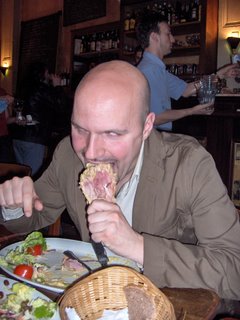Relax!!
June 3, 2006
Men fish, play golf, watch football, play computer games. Women shop. But don't confuse that with having fun, argues Germaine Greer.
Women either don't do leisure, or they do free leisure, or at best cheap leisure, or they fail to perceive any difference between work and leisure. Ask what a woman's leisure activity is and you're apt to be told, "Shopping".
Shopping is grinding toil that women mistake for play. Men stand bemused as women trudge from shop to shop looking for something better or cheaper than another thing that is virtually identical, wondering why they didn't buy what they wanted at the first shop that had it in stock. Men don't understand that if you haven't come close to dropping, then you haven't shopped. Men buy; women shop.
Most women would say that they have very little time to themselves. The time they don't spend working for the employer and the taxman they spend doing something called "housework", to which, for most women between the ages of 25 and 50, may be added "child care". There is also the onerous task of body maintenance, keeping the otherwise disgusting female body clean, tidy, deodorised, made up, not to mention toned and becomingly clad, plus the exhausting, sometimes painful and expensive business of hair and hairiness management. Work, all of it.
There are powerful historical reasons for women's imperviousness to the demands of leisure. The typical world citizen - who is still female, illiterate and an unpaid family worker - knows only too well that if she is ever to be seen with her hands in her lap, a job will be found for her. In traditional societies, the high days and holidays on which menfolk are permitted to straighten their backs and put on clean clothes are the days on which the women have to work the hardest, smartening up the house and putting together giant meals. It is not so long ago that on Sundays, while the rest of the family frolicked, the woman of the house had to cook and serve a three-course Sunday lunch and clean up after it.
Many women these days would like nothing better than the chance to serve soup, roast and pudding to the assembled family once a week. If they don't do it any more, it is less because they rebelled against such hard labour on everybody else's day of rest than because nowadays there isn't anybody around to eat the food they cook. Everybody else is out doing leisure. Has the woman of the house grabbed a kitbag and followed their example? Apparently not. Women don't go fishing. Women do play golf, but not many and not much. Women don't buy sports equipment or season tickets. Women don't buy sports cars, boats, power skis, trailbikes, guns, crossbows ... Women don't collect stamps, spot trains, buy music products. Women do use gyms, but not for fun.
If leisure is what you do when you are not working for a livelihood, then the women who were excluded from the paid workforce never had anything but leisure, but their leisure, as Thorstein Veblen explained, was vicarious leisure, its purpose to display for all to see the status of the man who owned them and could afford to let them sit about all day every day. Ladies of leisure were not permitted to enjoy their leisure. They couldn't go rambling about or fishing or playing cricket on the green or burying themselves in books. Instead, they had to fill their hours with useless, pointless, unproductive, repetitive work: beadwork, shellwork, tatting, making cut-paper patterns and silhouettes, japanning, plus what George Eliot called "a little ladylike tinkling and smearing". For the affluent, housework used to be done by servants. Boiling up shirts and sheets, ironing, polishing floors and furniture, blacking grates and shining silver used to be heavy work. The lady of the middle-class house wasn't expected to break into a sweat. It was only when machines replaced maids that vicarious leisure could take the form of housework.
Occasionally some foolhardy academic tries to suggest that housework is a leisure pursuit, the paradigmatic "leisure industry", which is one way of saying "keeping very busy doing nothing". Women will not accept this version of their reality; they want us to believe that they hate and resent housework, but that "someone has to do it". The people who make money out of this kind of leisure industry are multinationals such as Unilever and Procter & Gamble, and by manipulating women's insecurities they make unimaginably huge amounts of it. Currently, women are fighting a war on bacteria, nasty, deformed aliens who hide under toilet seats and on work surfaces. Where lazy boys play murderous video games, diligent housewives deal out death and destruction to an equally fictitious enemy. The boys know they are playing; the women think they are working.
The men's leisure industry covets the trillions of dollars' profit made by Unilever and Procter & Gamble. If it has seriously tried to entice women away from the housework and win back the money they splurge on home-care, there is no sign of its succeeding. Half of the population remains inaccessible to the leisure industry because of the fantasy war against filth, which requires the cleaning of a house already too clean. I have yet to see any ad appearing in a women's magazine saying, "Your house is clean enough. Come out and play!" In a current women's magazine, one advertisement shows a bare-chested hunk on a sunset beach holding what appears at first glance to be a boogie board. In fact it is an ironing board, and the advertisement challenges its readers, "Still finding excuses to keep your old ironing board?" The same magazine carries two advertisements for cars, one of which begins, "Slip behind the wheel of a new Ford Territory and you can relax in the knowledge that you're surrounded by a legion of safety features" - and proceeds to list them all. No suggestion that driving a car might be fun, in fact, nothing about the car's performance at all.
Women are not listening to the siren call of leisure. But it is also true that the leisure industry does not address itself to women. This may be simply because no female market exists, but an elderly market certainly exists and the leisure industry ignores that, too, even though older people have more disposable income than younger people. The goods and services older people use are never characterised as such. The explanation is not simply that advertisers are ageist, but that senior citizens themselves are ageist. The greyest of nomads would not buy an RV (recreational vehicle) that was advertised as ideal for grey nomads.
Older women, whether they play bingo or break out the camp stove, are heavily involved in leisure, but theirs is cut-price leisure. They are not in the market for recreational vehicles, or powerboats, or even motel accommodation. They are the people who make possible literary festivals and antique fairs, who support local art galleries and museums, who volunteer for every community chore, and happily raise money for what they believe to be good causes, giving, giving, giving of their time free. If we had a way of quantifying the output of the leisure industry of older women, we would probably see that it contributes vastly more to the GDP than the corporate leisure industry.
This article follows from Germaine Greer's speech at
Permira Leisureland, a panel debate on the future of the leisure industry in the UK.
 M&J: Exploiting the supremely generous European public holiday schedule, we took a nice four day long weekend to Alsace and Lorraine. Despite the rather (to understate it) inclement weather, we embraced the trip unabandoned relish.
M&J: Exploiting the supremely generous European public holiday schedule, we took a nice four day long weekend to Alsace and Lorraine. Despite the rather (to understate it) inclement weather, we embraced the trip unabandoned relish.

 Despite the inclement weather, and several bouts of banditry (Frederic and Sandra both had items stolen that night), M.C.R's mission was deemed a great success. He has agreed to renew his friendship with JK for another term.
Despite the inclement weather, and several bouts of banditry (Frederic and Sandra both had items stolen that night), M.C.R's mission was deemed a great success. He has agreed to renew his friendship with JK for another term.



